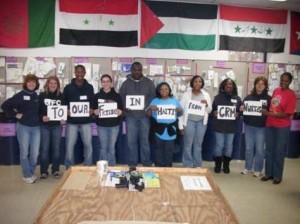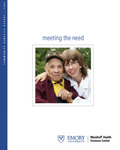
Dr.Shih and her husband Chad Aleman, MD, decorating and dedicating a rose on the actual float prior to the parade.
Jennifer Shih, MD, a current Fellow in the Department of Allergy and Immunology at Emory University School of Medicine and a heart transplant survivor, was an honored guest on the Donate Life float in the 2011 Rose Parade.

Dr. Shih, second from left, riding on the Donate Life float, which won the trophy for best theme
Dr. Shih was one of five winners who received a trip to Pasadena, California, and an opportunity to be in the Rose Parade through an essay contest sponsored by Astellas’ Ride of a Lifetime.
In 2004, after Dr. Shih had completed three years of pediatric residency to fulfill her dream of becoming a pediatric cardiologist, her world was suddenly turned upside down.
She was on call one night Cincinnati Children’s Hospital when she started feeling tired and short of breath. She knew something was wrong. Instinctively, she performed an echocardiogram and found fluid around her heart. Shih diagnosed herself with a heart condition, giant cell myocarditis.
Her condition quickly deteriorated and within a week of being hospitalized, she was told she would die without a heart transplant. She was placed on a BiVAD (Bi-ventricular Assist Device) to keep her alive.
Less than two weeks after self-diagnosis, she received a life-saving heart transplant.
Although she wasn’t able to practice pediatric cardiology anymore due to the activity and risk of infection exposure post-transplantation, she was able to change her specialty to allergy and immunology. Shih says her experience makes her a more empathetic doctor because she truly understands what it is like to be a patient.
Along with her family and friends, Shih created the Have a Heart Benefit Fund in 2004, which raises money to provide patient care, education and research the transplant field. She says she has always loved helping people, and she felt this would be a great way of showing her appreciation to donor families.
“I would not be alive today without my gift of life. I am a testament to the impact becoming an organ donor can be. You can have the opportunity to save eight lives in one day by being an organ donor… how many of us would have that opportunity otherwise?†Shih asks.











